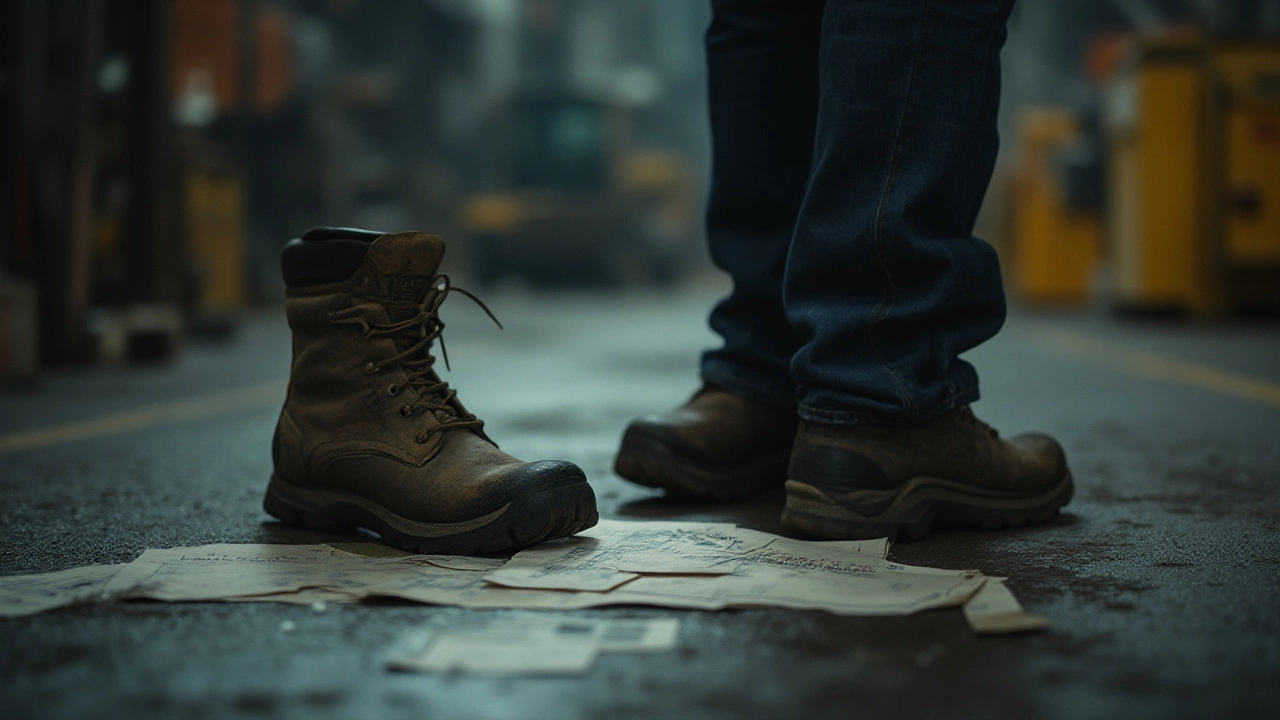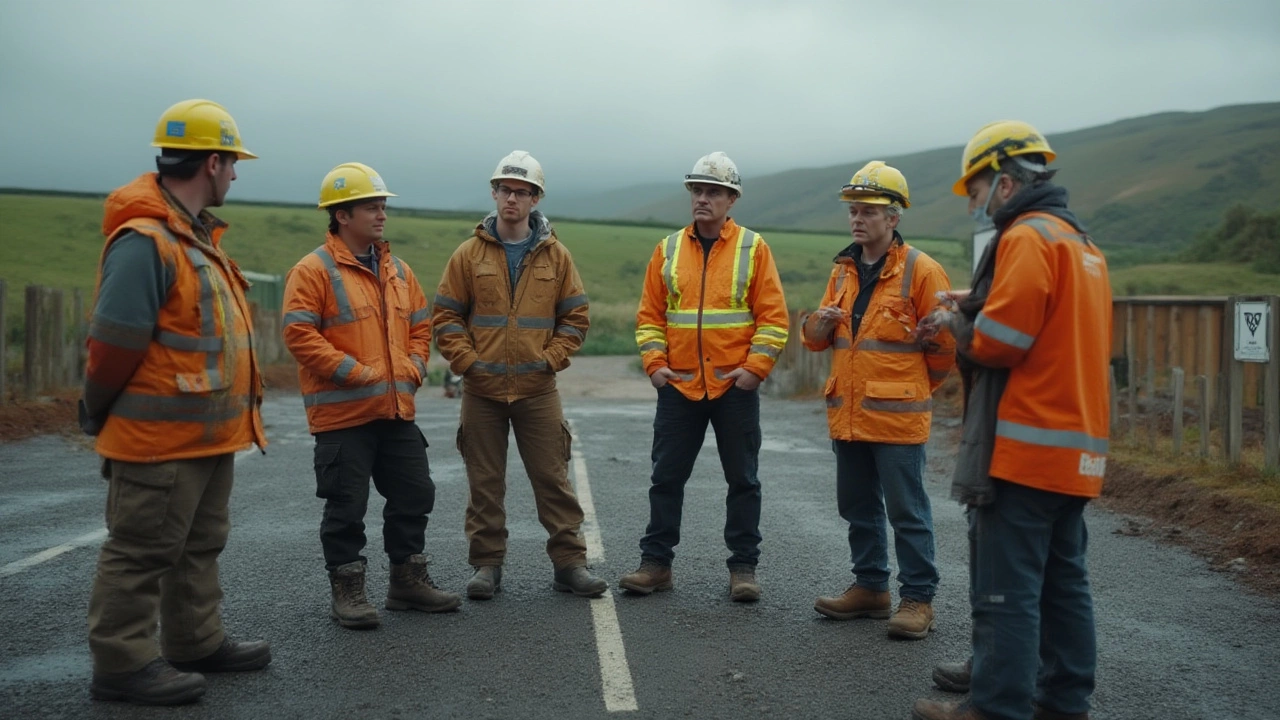It’s raining, it’s Monday, and you’ve just found out you’re stuck wearing heavy, steel-capped clodhoppers again at work. Across the Irish market—from building sites in Cork to food factories in Limerick—people ask the same question: “Can I refuse to wear safety shoes?” Rules about work shoes sound pretty strict in Ireland, but there’s more to it than a simple yes or no.
The Law on Safety Shoes in Ireland: What You Need to Know
In Ireland, workplaces love their rules. Picture a construction site in Dublin or a warehouse in Shannon; the high-vis jackets and big, chunky safety boots aren’t just for show. The Health and Safety Authority (HSA) keeps everyone in check under something called the Safety, Health and Welfare at Work Act 2005. In simple English, this law says employers have to keep workers safe—including by providing personal protective equipment (PPE), like safety shoes, when there are real risks to your feet.
If the risk is real—think dropped tools, moving pallets, sharp objects, caustic cleaning fluids—you can’t just say, “Ah sure, I’ll take my chances.” Under Irish law, if your job exposes you to hazards and your employer says you need safety shoes, they’ve got evidence on their side. Employers must assess hazards, and if their safety check shows a risk, they have to offer the right shoes for the job, no matter if you’re in Galway’s pharma labs or Waterford’s new supermarket build.
The HSA can even pay a visit if someone complains or if there’s an accident. They won’t find it funny if you’re walking around a demolition site in runners. If something happens—let’s say you break a toe and you weren’t wearing the safety gear—the insurance lads aren’t likely to cough up. And if it goes to court, an Irish judge usually listens to the law—not to “I just didn’t fancy them.”
One interesting stat: In 2023, the HSA reported that slips, trips, and falls made up 20% of workplace accidents, and about a fifth of those injuries involved poor or missing footwear. That's no small number, considering thousands of workers hit the A&E every year with mashed up toes, crushed feet, or nasty chemical burns.
When Can You Refuse to Wear Safety Shoes in the Irish Workplace?
Some folks imagine there’s a loophole—maybe your cousin’s friend swore there was a medical reason. Is that enough? Well, yes and no. If you genuinely can’t wear the PPE—for example, if you’ve got a diagnosed foot condition or an allergy to materials used in standard safety shoes—the law asks for “reasonable accommodation.” That fancy phrase just means your employer should try sort you out whenever possible. More on that in a second.
So here’s where things get a bit Irish. If you don’t face any workplace hazards—say, you work in an office and you’re not straying anywhere near a warehouse or shop floor—there’s usually no legal requirement for safety shoes. If the boss insists on making everyone wear PPE just because it’s easier, you can question it. The HSA website talks about “suitable and adequate” risk assessment, which means employers should only make rules that protect you from actually likely risks—nothing more.
But if your job involves real hazards, refusing isn’t so simple. The legal risk is on you. If you say no, your boss could discipline you, or even show you the door, though they have to follow fair procedures under Ireland’s Unfair Dismissals Act. If you think the shoe doesn’t fit (literally or legally), your first port of call should be a chat with HR—or a union rep, if you have one.
On the medical side, Ireland’s Health and Safety (General Application) Regulations say you’re entitled to alternative PPE if you provide proper medical evidence. You’ll need a letter from a GP or consultant; “my mate’s chiropodist says” won’t fly. Your boss is meant to work with you, maybe providing custom-fitted safety shoes or alternative materials. If there’s no workaround, they may have to move you to a safer area—without risking your job.
- If you have flat feet, diabetes, or another long-term issue, look into specialised Irish brands like Portwest (based in Westport) which offer wide-fit or hypoallergenic options.
- Dublin’s O’Reilly Shoes and Galway’s Gaelic Footwear even do on-site fittings for larger workplaces.
- The Irish Congress of Trade Unions (ICTU) has pushed for more inclusive PPE policies in big food processing plants and construction companies, so it’s worth checking if your union can help fight your corner.

Irish Work Culture and Attitudes Around PPE
Now, Irish people have a reputation for being a tad stubborn—and not always shy about a bit of “sure, it’ll be grand.” But let’s be real—no builder on the M50 expansion actually wants to lose a toe. There’s a reason local legends and GAA coaches alike hammer home that safety comes before style.
That said, people in Ireland do care about a fair balance between common sense and company policy. There are tetchy debates in many small companies—especially in smaller towns like Tralee or Sligo—where workers might feel health and safety edicts from head office in Dublin are a step too far. But there’s growing trust in the system. Workers want safety gear that actually works, not just tick-boxes and corporate messaging.
Local councils and the HSA are keenly aware of Ireland’s mix of old-school traditions and modern workplaces. That’s why, after a spike in accidents on construction sites around Louth and Meath in 2022, there was a weeklong safety campaign blitz—radio ads on RTÉ Radio 1, pop-up clinics at industry expos in Citywest, and even text alerts for farm contractors working around Kilkenny and Tipperary. That campaign pushed not just “wear your safety shoes,” but “make sure they fit or speak up.”
There’s nothing unusual these days about Irish employers focusing more on softer, comfier PPE. The days of clunky boots that made you walk like Frankenstein’s monster are fading. Some workplaces even let you pick from a catalogue; hospitality and retail workers in Cork’s Mahon Point shopping centre get vouchers to choose styles from Irish safety wear shops like Safety Direct in Galway.
And if you think the law’s all stick and no carrot—think again. Quite a few Irish companies now offer incentives: monthly draws for new boots, cash vouchers if staff hit injury-free targets, or gift cards for local shops like Dunnes Stores and SuperValu.
Real-Life Stories, Facts, and Trends in Ireland
Fancy some hard facts? According to an HSA 2023 report, there was a notable drop in foot injuries across Irish factories and building sites after larger companies like BAM Contractors and Kerry Group brought in regular fit-checks and staff training. It turns out, if shoes fit, people are far more likely to wear them. Go figure.
Let’s cut to a few actual stories. One guy in Carlow, a warehouse worker at a major food distribution centre, fought for six months to get proper diabetic-friendly safety shoes. He finally won his case after Ireland’s Workplace Relations Commission (WRC) got involved, pointing out that his employer had to make “reasonable adjustments.” Now, the company keeps several alternative pairs on-site, and workers can book a fitting at Boots or Elverys Sports.
On the other side, a young woman in a Co. Mayo factory refused to wear steel-toed boots, saying they made her feet blister and triggered migraines from the heat. Instead of digging their heels in, her management worked with footwear brand Portwest and sourced breathable, lighter composite-toe shoes. Later, the whole site switched over after staff votes—proof that solutions aren’t always about conflict.
Here’s a table showing why people say no to safety shoes—and how Irish companies tend to respond:
| Common Complaint | Irish Employer Solution | Success Rate (According to HSA) |
|---|---|---|
| Don’t fit (too tight/loose) | Offer range of sizes and fits; arrange specialist fitting at local store | 85% |
| Material causes blisters/allergy | Switch to allergy-safe or padded designs; order hypoallergenic options | 77% |
| Too heavy/hot | Source lighter or composite-toe varieties | 81% |
| Standing all day aches | Provide insoles, anti-fatigue mats | 70% |
This mix of real feedback shows something important: Irish culture is one of conversation, not command. If the shoes are wrong, speak up—don’t quietly take it or sneak off the PPE when the foreman’s not looking.

Tips for Workers: Navigating Safety Shoe Policies in Ireland
So what do you do if you’re stuck with boots that hurt, don’t fit, or just seem ridiculous for your actual job? Here’s the Irish approach—equal parts common sense and straight-talking:
- Start with a friendly word—Irish workplaces, big and small, usually prefer a cuppa and a quiet chat to a blazing row. Tell your supervisor or HR if the gear isn’t working. Don’t just hide your scuffed shoes in the boot room and hope nobody notices.
- Get the facts—Ask to see the risk assessment that proves you need safety shoes. Irish law says you’re entitled to see the PPE decision in black and white, especially if it’s being bested on a blanket policy.
- Bring a doctor’s note—If you’ve got a genuine reason (injury, diabetes, pregnancy, allergies), ask your GP or podiatrist in Ireland for a formal letter. You’ll need this for the HR files and to make sure the company ticks the legal boxes.
- See what’s out there—Irish suppliers often carry a decent range, from orthopaedic safety shoes to lightweight, breathable runners. Dublin’s Safety Direct, Cork’s Foot Solutions, and even Amazon.ie now stock options tailored for Irish feet and Irish weather.
- Use your voice—If you’re worried your workplace is overdoing PPE, or refusing to handle health issues, call the HSA’s helpline or talk to your union. The Irish Federation of University Teachers (IFUT), SIPTU, or Unite—the list is long and they know the law better than most.
- Don’t be afraid to compromise—Sometimes it’s not “all or nothing.” Maybe you need the big boots in the depot, but not in the office. Work out a smart arrangement, record it in writing, and you should have no hassle.
Quick expert tip for Ireland: Wet weather boots with puncture-resistant soles are weirdly handy, especially outside Dublin and the east coast, where oily farm tracks and rainy yards are normal. If your job has you outside half the day, pick boots rated for waterproofing—there’s nothing worse than soggy socks all winter in Donegal or Kerry.
For those short on cash, check if your employer has a voucher scheme. It’s common for big warehouse chains in Naas or Drogheda to offer a yearly allowance, and even smaller construction firms in places like Athlone or Wicklow will sometimes reimburse receipts for approved shoes—just keep the paperwork from trusted Irish suppliers.
And if you try everything and they still won’t budge? Irish law says the HSA or WRC can mediate. And if you lose your job for refusing safety shoes without fair cause, the Workplace Relations Commission can help you challenge it. But remember—safety comes first, and there’s usually a solution that suits both your feet and the rules if you push for it.
